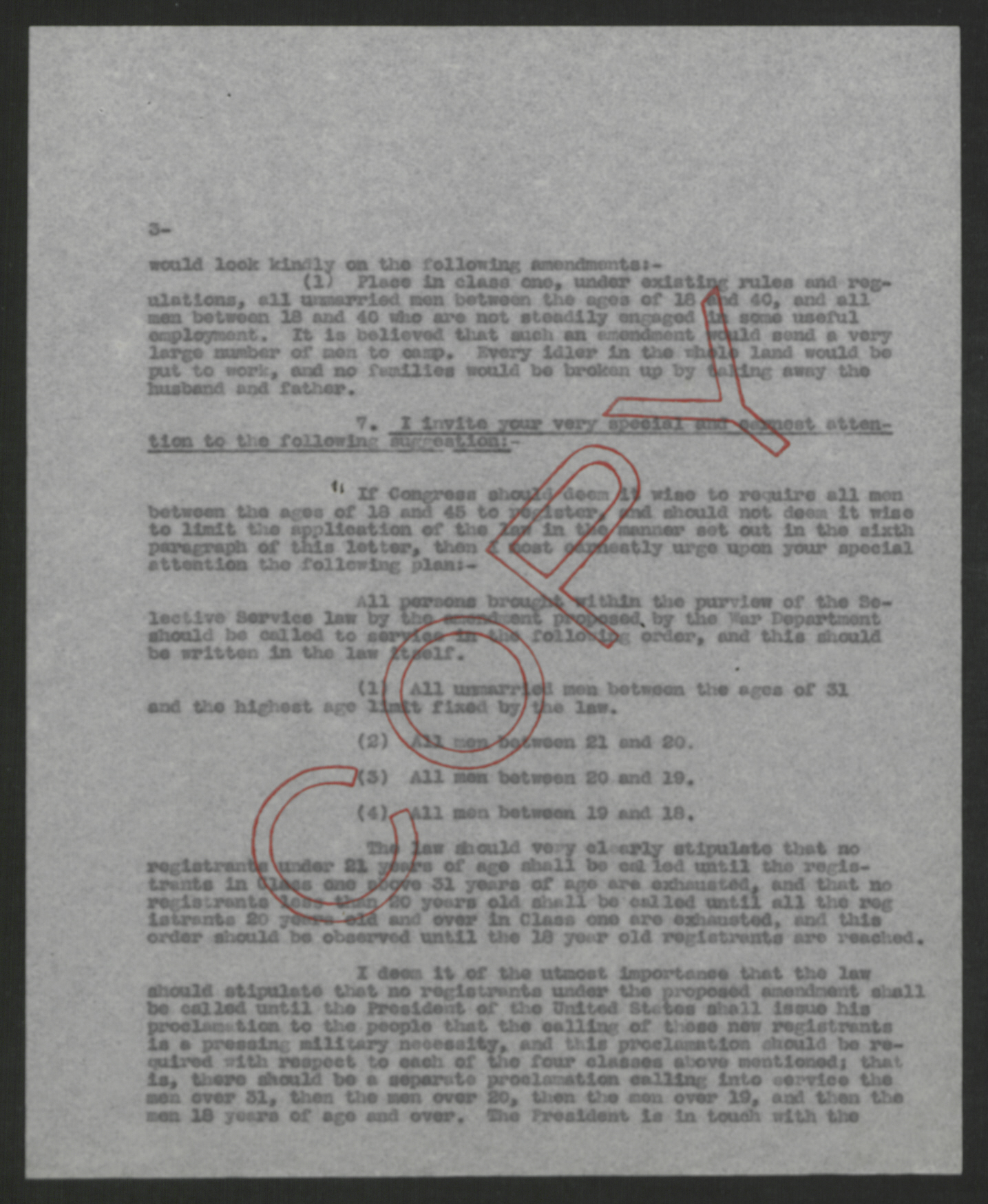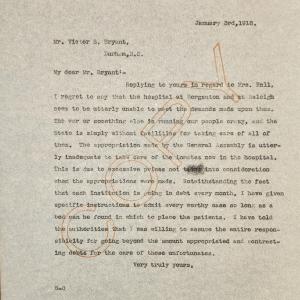August 6th, 1918.
My dear Senator Overman
Section 27 of the Selective Service regulations provides:
“The Governors shall be charged with general supervision over all matters arising in the execution of the Selective Draft within their states.”
It is assumed that this provision was made because the Governors live daily in intimate contact with the people, and are in position to apply rules of “common sense and sympathy” in the administration of the law so necessary to its frictionless enforcement. I have faithfully endeavored to discharge the duties imposed on me, and long before the Selective Service bill became a law, I went from the mountains to the sea preaching that the bill embodied the very essence of justice and of wisdom. I am still of that opinion. It is the very fairest and wisest law under which any army was ever raised.
My intimate knowledge of the actual operations of the law, and of the attitude of the people towards its enforcement causes me to view with grave apprehension the proposal to bring within its purview all men between the ages of 18 and 45. The one supreme necessity for the successful prosecution of the war is to keep the people solidly behind the Government. In the beginning there was a vast deal of hostility to the Selective Service Law, but this has happily disappeared, and the few people who do not now endorse the law submit to it in solemn silence.
I am fearful that a blanket extension of the law so as to include all men between the ages of 18 and 45, will kindle anew the fires of opposition and result in more embarrassment than benefit. With the utmost deference to the War Department, and with the unalterable purpose of doing everything in my power to enforce whatever law the Congress may in its wisdom finally enact, I submit that the amendment as reported in the newspapers is unwise.
1. About 75 per cent of the people of North Carolina live in rural communities. We are essentially an agricultural people. Our records disclose that out of this rural population only 2,000 have been granted deferred classification on agricultural grounds. The boards have combed the farms clean, and the shortage of farm labor at present time is acute. The crops are being made this year largely by young men between the ages of 18 and 21. If these shall be taken away from the farms I am at a loss to understand how our people can make crops next year.
2. 75 per cent of the students in our colleges are between the ages of 16 and 21. The enactment of the proposed law would close down every college for men in North Carolina. It would not do at all to defer college students within the draft age, and fail to grant a like deferment to farmers and mechanics. The one thing that has reconciled the people to the draft law is that it treats everybody alike. The law is the incarnation of the principle of equal and exact justice to all and special privileges to none. To allow a man to escape from going to war whose father is able to keep him in a first class college, and send to the war the neighbor boy who follows the plow, would, in my opinion, result in a revolution in North Carolina. The cry would go up from the mountains to the sea that all that was necessary to keep out of war was to have money enough to go to College. I notice that the War Department has announced such a policy under the existing law. It is probable that no tumult would arise because of the comparatively few number of men who remain in college after they are 21, but it simply will not do to enact a law that a man can go to college and keep out of the war.
3. There is a wide spread feeling in the hearts of the people, the very universality of which entitled it to grave consideration, that a man ought not to be conscripted before he is old enough to vote, in the absence of a very pressing and overwhelming military necessity.
4. I seriously doubt the fighting value of the average man over 40 years of age. He is lacking in elasticity and in the power to endure hardships. I think the maximum age for conscription should be 40.
5. I fail to see the pressing and overwhelming military necessity that would alone justify the proposed extension in the minds of the people. Under existing laws practically four million men are available, and to these will be yearly added a half million men as they arrive at the age of 21, so that, without any amendment to the law, four and a half million men would be available in twelve months. This would enable us to put three and a half million men “over there,” and still have a million in reserve.
6. But the ranks can be swelled in a way that will not impose serious hardships and that will tend to bring the law into favor rather than into disrepute among the people. The folks down home would look kindly on the following amendments:-
(1) Place in class one, under existing rules and regulations, all unmarried men between the ages of 18 and 40, and all men between 18 and 40 who are not steadily engaged in some useful employment. It is believed that such an amendment would send a very large number of men to camp. Every idler in the whole land would be put to work, and no families would be broken up by taking away the husband and father.
7. I invite your very special and earnest attention to the following suggestion:-
If Congress should deem it wise to require all men between ages of 18 and 45 to register, and should not deem it wise to limit the application of the law in the manner set out in the sixth paragraph of this letter, then I most earnestly urge upon your special attention the following plan:-
All persons brought within the purview of the Selective Service law by the amendment proposed by the War Department should be called to service in the following order, and this should be written in the law itself.
(1) All unmarried men between the ages of 31 and the highest age limit fixed by the law.
(2) All men between 21 and 20.
(3) All men between 20 and 19.
(4) All men between 19 and 18.
The law should very clearly stipulate that no registrants under 21 years of age shall be called until the registrants in Class one above 31 years of age are exhausted, and that no registrants less than 20 years old shall be called until all the registrants 20 years old and over in Class one are exhausted, and this order should be observed until the 18 year old registrants are reached.
I deem it of the utmost importance that the law should stipulate that no registrants under the proposed amendment shall be called until the President of the United States shall issue his proclamation to the people that the calling of these new registrants in a pressing military necessity, and this proclamation should be required with respect to each of the four classes above mentioned; that is, there should be a separate proclamation calling into service the men over 31, then the men over 20, then the men over 19, and then the men 18 years of age and over. The President is in touch with the civil population. He understand the necessities of civil life, and the people would have the utmost confidence that he would not call into service any of the class above named until they were actually needed for the successful prosecution of the war.
I am sending copy of this letter to both of our Senators, and to each of our Representatives in Congress. I think I properly interpret the thought of our people in regard to this situation. The President himself has vast respect for what the people are thinking, and Congress should likewise give to their views the most serious consideration.
Sincerely yours,
Governor
B-G








